This interview is part of our interview series, where we curate stories of regular people that decided to design a life they love. (click here to learn more).
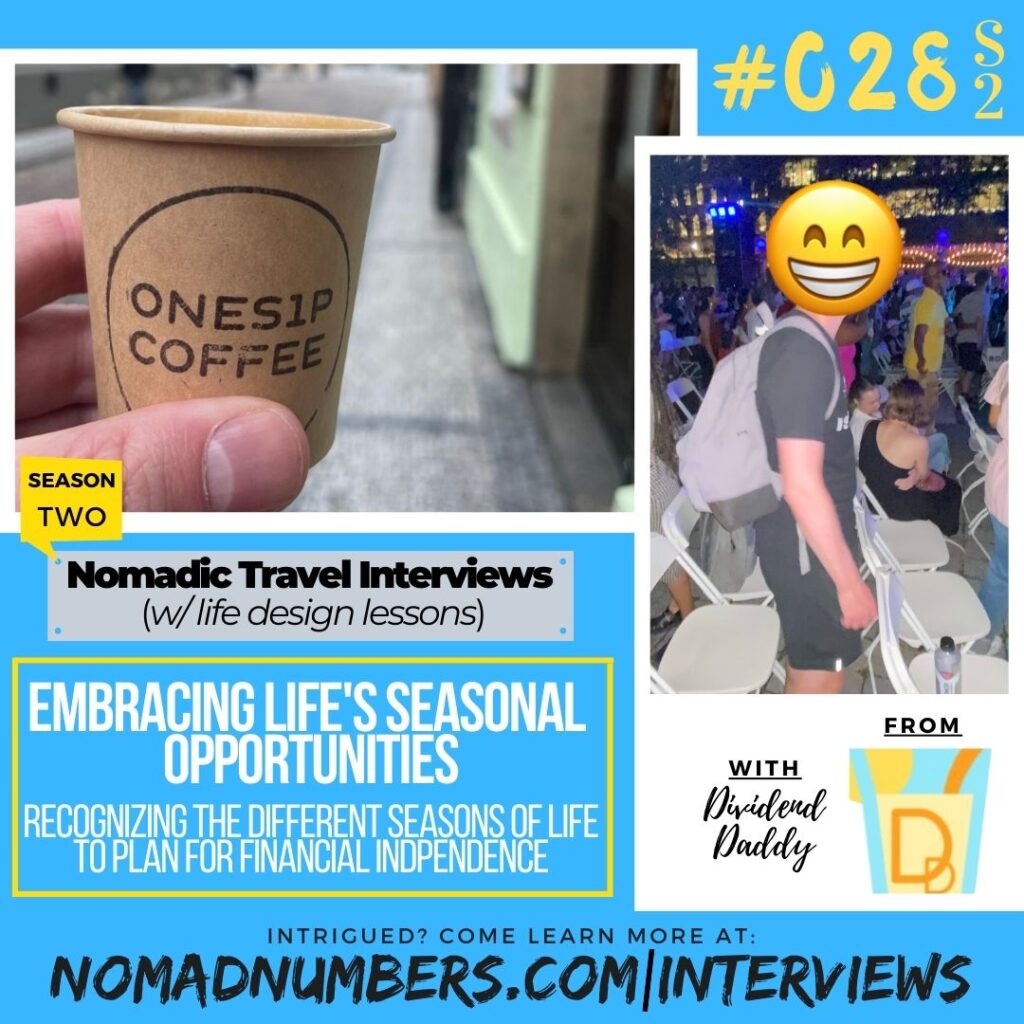
Dividend Daddy
Some links to the products mentioned below are affiliate links, meaning that if you click and make a purchase, we (Nomad Numbers) may receive a commission at no additional cost to you. For more information please review our disclaimer page.
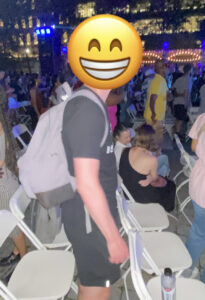
1. Can you introduce yourself?
Online and on social media I’m known as Dividend Daddy. While I am anonymous online, I do meet up in person with a number of friends in the FIRE (Financial Independence and Retire Early) community and I am always happy to meet new friends in this space and the nomadic community internationally.
I’m a single (send single eligible bachelors my way please), mid-40s, and Canadian. I still call Canada home (for now). I don’t have any children. I work full-time for now but am eager to enter the next stage of my life of financial independence and work being optional. I have worked in law and public policy in various facets for my life and made a decent income and saved well. What I was saving for wasn’t clear to me for many years as I assumed I’d retire at the standard 65 years old. Only when I saw enough of the “I’m 22 years old and retired” stories online and dug a little deeper to come across blogs like Mr. Money Mustache and others, that I realized that my savings had a goal. From that point on, I went deep like so many others.
I own my home mortgage free and have another rental condominium and vacation home in Mexico. I’m thinking through and oscillating between renting out my principal home as a short-term rental under property management while I travel or outright selling it and investing a portion of the proceeds and keeping the rest in cash for if/when I find a place that isn’t where I am living currently in Canada that I’d like to settle down in. I’ll probably sell the other rental condo although it cash flows either way if I keep it.
2. What does a typical day in your life look like for you today? How does it differ from your life before?
Currently, I am working full-time. My typical day has me waking up at 7am and getting ready for work, packing my lunch, hopping on my bike to work and arriving at around 830am. I am at work until 5pm. I cook dinner at home and if I don’t have plans, I spend my time listening to a podcast or going for a bike ride. Thursday and Friday I work from home.
In terms of the future and the aspirational life I want to live and am planning to live, my typical day in my home city would probably still mean waking up with an alarm clock. I am usually in bed by 10 to 11 pm regardless of the day of week so that I am up early. The morning is my favorite part of the day. I like to go for a walk in the mornings to a local cafe to read the news and check social media and my stock portfolio.
A good day would be doing an hour of gym class with something artistic in the afternoon or evening, which could include a documentary, jazz or blues live show, or art exhibit. Bonus points if a drink or dinner party is thrown in there.
Overall, I envision my future life consisting of a focus on slow travel, health, tourist sightseeing, and contract work / “fun” work on my blog and social media (growing output of these) and including YouTube.
Life design journey
3. What inflection point led you to decide to change your life trajectory?
I think it was a myriad of things that came together: COVID, middle age, and reading Your Money or Your Life and Die with Zero. The concept of “seasons of life” stuck with me. When I was in my early 20s, I took 4 months off between university semesters to backpack through Europe and stay in hostels. Looking back from my current age, I’m still physically fit enough to do the same trip. However, in my mid-40s, I don’t want to do that trip anymore. For one, I like my 7 to 8 hours of sleep a night. The thought of a bunch of rowdy teenagers waking me up at 3am coming into the hostel from a party is not something I want anything to do with now. So I’m glad I made that trip in my early 20s. There are things I want to do now that I can’t simply do with 4 weeks paid vacation each year with my full-time job. I’ve got a nice season of life from my mid-40s to 65 years of age where I can still physically do so much. I’ve got to take advantage of this season now.
4. What were some of the limiting beliefs that hold you back initially?
While I haven’t made the jump to full-time travel yet, I would be lying if I didn’t say the money didn’t hold me back and the proverbial “one more year syndrome”. I am fortunate to be very well compensated. Turning that down is a cognitive challenge for me but taking my current employer on initially under a contract would free me up to travel while earning a bit of “gravy” money to stay at nicer Airbnb’s and take advantage of some luxuries.
5. What did you do to prepare the transition to this new destination and how did you do it?
I’ve been doing several things including:
- Continuing to invest to increase my Projected Annual Dividend Income (PADI)
- Meeting with a real estate agent to evaluate the market value of my principal residence and rental property if I choose to sell one or the other
- Meeting with a property manager if I decide to rent my principal home as a furnished short-term rental while traveling in early retirement. I have a # of small projects around my house to get it ready for such a scenario including fixing a light and cleaning out my storage locker, etc.
- Signing up for Trusted Housesitters to potentially use that site as a way to defray some lodging expenses in early retirement. I am still in the research phase but will ultimately sign up this fall and hopefully do a few housesits in my home city as a way to build credibility on the platform.
- I’ve also researched the platform Fiverr as a potential platform for some contract work though not sure if my line of work is ideal for such a platform
- I’ve taken on a side contract while fully employed as I would like to transition to work optional while early retired (so I’m dipping my toe in before I leave my full-time job).
6. How long did/will it take to reach the destination? Any advice to make the journey as enjoyable as possible?
I have been saving and investing since my early 20s. At the time, I was doing so for what I thought was the normal traditional retirement of 65 years old. After reading too many headlines about “I’m 25 and retired” and being annoyed, I dug a little deeper and read the back story in detail from Bryce and Kristy and their “Millennial Revolution” blog and how they retired early and now travel full-time (although with their new baby, I’m not sure how that is going to work out for them). This article about them I read sent me down a rabbit hole to find Mr. Money Mustache and a realization that I was financially independent. This set off a “what if” scenario in my mind and constant questioning of why I was sitting in an office wasting away the valuable healthy years remaining in my life when I didn’t have to and the regret I know I would have at a later age if I didn’t act now or at least soon to make a life change and retire early to travel and own my time.
7. What did the people around you (friends/family/colleagues…) think of your plan to take on this new life?
Honestly, almost daily my Mom tells me to quit and travel. She’s my biggest cheerleader. My friends wish they were in a position to do so and I know my siblings are desperate to follow in my footsteps.
Cost of living
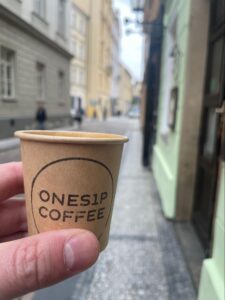
8. How much yearly expense did you have before and after this change in lifestyle?
I am not on my journey yet so I provide a breakdown of current costs as of January 2023
| Category | Description | Cost per person and per day |
|---|---|---|
| Accommodation | Anything you pay toward keeping a roof over your head (ie. rent, internet, water, utilities…) | 762.20 CAD |
| Alcohol | Anything related to alcohol you purchase | $22.00 CAD |
| Groceries | Anything related to the groceries you get to cook at home | $387.28 CAD |
| Dining out / Take-out | Anything related to what you spend when dining outside of your home. | $117.65 CAD |
| Activities / Entertainment | Anything you pay related to ‘fun money’ (ie. park fees, outdoor activity, AirBnB experience…) | $0 CAD |
| Health Care | Any cost related to treatment you are receiving on a given location. | $0 CAD |
| Local Transportation | Anything related to transportation within the boundary of the location you are staying at. | $60.88 CAD |
| Living expenses | Anything else that you are spending money on to live in a specific location that can’t fit anywhere else (ie. Haircut, Netflix, cell phone…) | $217.81 CAD |
| Miscellaneous | Anything else? | $79.09 CAD |
| TOTALS | Monthly total | $1,646.91 CAD (or $1,187 USD) |
9. What strategies have you used to reduce your expenses?
I’m not traveling nomadically currently, but I can comment on keeping my costs down in the lead up to this new lifestyle:
- Make most meals at home
- Bring my lunch to work
- Shop at a discount grocer + Bulk Barn to purchase items like nuts in bulk, tea, oats, peanut butter in bulk at sizable discounts. Buy and Freeze meat and fish when it’s on sale.
- Ride my bike as my main mode of transportation
- Don’t buy new clothes
- Host dinner parties as a form of entertainment with friends + free city events
- Take advantage of early dining discounts or specials on certain days of the week at local restaurants
Lessons, tips & advices
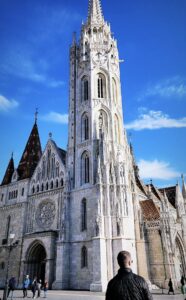
10. If you had to do it again, what would you do differently?
Like mostly everyone, I think I would have saved more and invested more. Considering the way in which the Canadian real estate market has exploded, I also would have bought more real estate.
11. What advice do you have for others who are considering going through a life design exercise?
Keep your spending in check, particularly the big three: housing, food and automobiles. I have never owned a car in my life and prefer instead my bike, walking and public transit. Also keeping up with the Jones’ is a waste of time – save more than you invest and in particular more than 20% if you can (at times I was saving 50%+ each year). In addition, do whatever you can to increase your income. A high income has been a huge key to my success while keeping costs (especially the big 3 listed here) low.
12. What is one resource (blog, podcast, book beside your own) you recommend for those that want to design their own life?
Things I have devoured personally include: Digital Nomad Stories (podcast), Earn & Invest (podcast) Mad Fientist (podcast), and Two Sides of FI (podcast). The Wealthy Barber is a big one in terms of books for Canadians (it is effectively our “Millionaire Next Door” equivalent). In terms of blogs, www.tawcan.com, www.myownadvisor.ca, and www.cutthecrapinvesting.com as three Canadian blogs are must reads.
Looking ahead
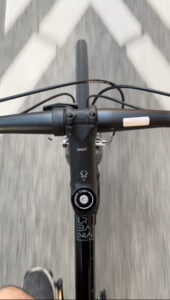
13. What is next for you?
Next for me is to get off the hamster wheel of a full-time 9-5 career. I plan to retire early / work optional and slow travel. While I am financially independent, I do plan to take on the occasional contract remotely if it is something I am interested in. I don’t need the money per se, so I can be picky. This money will be gravy that can offset some luxuries while traveling or add to my investments.
14. Is there anything I may not have asked that you would like to share with us?
I know in the FIRE community, the 4% rule is huge. However, for me, it’s just too stressful and the approaches to the 4% rule, be it a yield shield, bucket strategy, etc., my eyes just glaze over and my head hurts. I know why the 4% rule is popular. It’s because you can retire with less money given the often lower yields that index funds produce (2% range). However, a simpler approach is dividends. Let’s put aside the whole total returns vs. dividend debate, and I prefer to focus on the “what helps me sleep at night” and KISS (Keep It Super Simple) approaches. Dividends in early retirement mean all I have to do is spend them and not think about having to sell stock in down markets, yield shields, cash buckets, etc.
Thank you so much Dividend Daddy for sharing where you are currently in your life and the design change you plan on making in the very near future! We wish you all the best in pulling the trigger and can’t wait so see how much happier you will be in your life and you will get to spend more time doing the things you love!
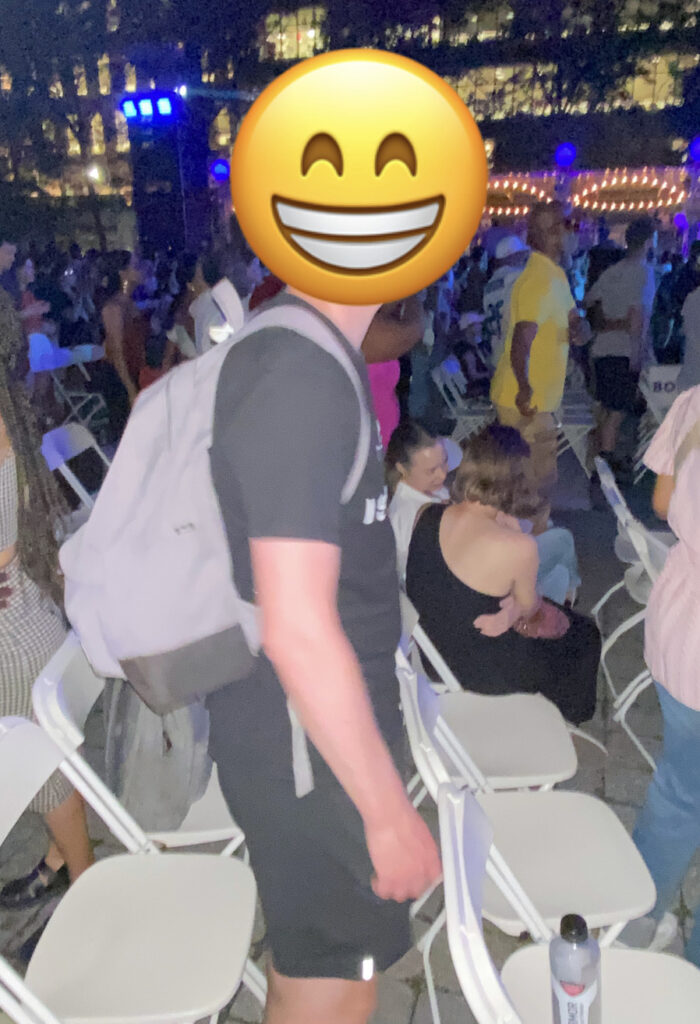
If you want to know more about Dividend Daddy, you can find him on the following platforms:
- Blog: Dividend Daddy
- Twitter: @dividenddaddy1
- Puerto Vallarta rental: Visit: https://www.instagram.com/serenitypvmexico (Contact me for a friends & family discount)
Rapid-fire questions
We like ending every interview by asking some fun rapid-fire questions to our guests
| What is your superpower & why? | My superpower is being able to hear a song from the 1980s and immediately know the artist and song title. I’m an encyclopedia. |
| What is your favorite travel destination & why? | Right now, it’s to my home in Puerto Vallarta, Mexico in the romantic zone. It ticks so many boxes for me including its walkability, local gay community, relative affordability, nature, sunny warm weather where it rarely rains outside the rainy season, and the local art scene. It’s so easy to make friends there that it’s a home away from home for me. Bonus is that you can rent it out as well. |
| What is the best Amazon (or online) purchase you made this past year? (Provide a link to Amazon or the product page) | I rarely buy anything, period, including from Amazon. I bought coffee pods in bulk and Vitamin D chewables most recently. I’m Canadian and we are sun starved. Vitamin D is a must. |
| What is the best Airbnb (or similar) you ever lived in and why? | Honestly, I’ve always been more of a hotel person. However, shifting away from quick vacations because of the need to get home to return to the office and work, I do plan to slow travel and stay in longer-term Airbnbs. So, I will have to get back to you on this one. |
| What’s something you can never live without? | Sunscreen |
| What’s the best piece of advice you’ve received? | I think Star Trek sums it up well: “Live long and prosper”. |
Our Bottom Line
Overall, Dividend Daddy’s highlights the importance of self-awareness, careful financial planning, and simplicity in achieving financial independence and designing one’s desired life. Here are the main lessons we took from this conversation:
- Lesson 1: Recognizing the different seasons of life. Dividend Daddy realized that there are activities and experiences he wanted to pursue in his mid-40s that were different from what he enjoyed in his early 20s. This lesson highlights the significance of aligning your life goals and experiences with your current life stage.
- Lesson 2: Financial Independence Preparation. Preparing for financial independence involves careful planning and saving. Dividend Daddy mentions that he saved and invested since his early 20s, which eventually allowed him to consider early retirement. This lesson underscores the importance of financial discipline and long-term saving strategies to achieve financial independence.
- Lesson 3: Simplicity in Financial Planning. Dividend Daddy favors a simple approach to financial planning, particularly in retirement. He prefers dividend income as a straightforward source of funding his retirement, avoiding complex strategies like the 4% rule or yield shields. This lesson encourages individuals to choose financial strategies that align with their comfort level and risk tolerance.
Sometimes we need to hear about others making unconventional decisions before we can have the confidence to make our own. If you have (or are on a path to) an unconventional journey to improve your life that has a nomadic component to it and are interested to share it, please reach out to us as we would love to consider your story for our blog.
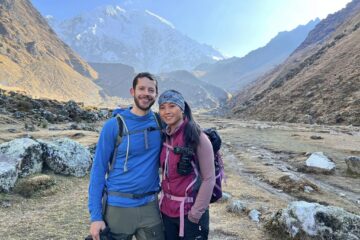
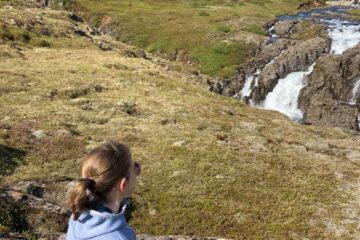
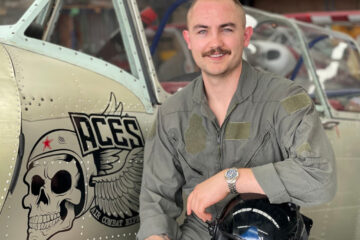
1 Comment
Dividend Update: October 2023 – Dividend Daddy · November 5, 2023 at 6:35 pm
[…] [Interview #028] Recognizing the different seasons of life to plan for financial independence […]